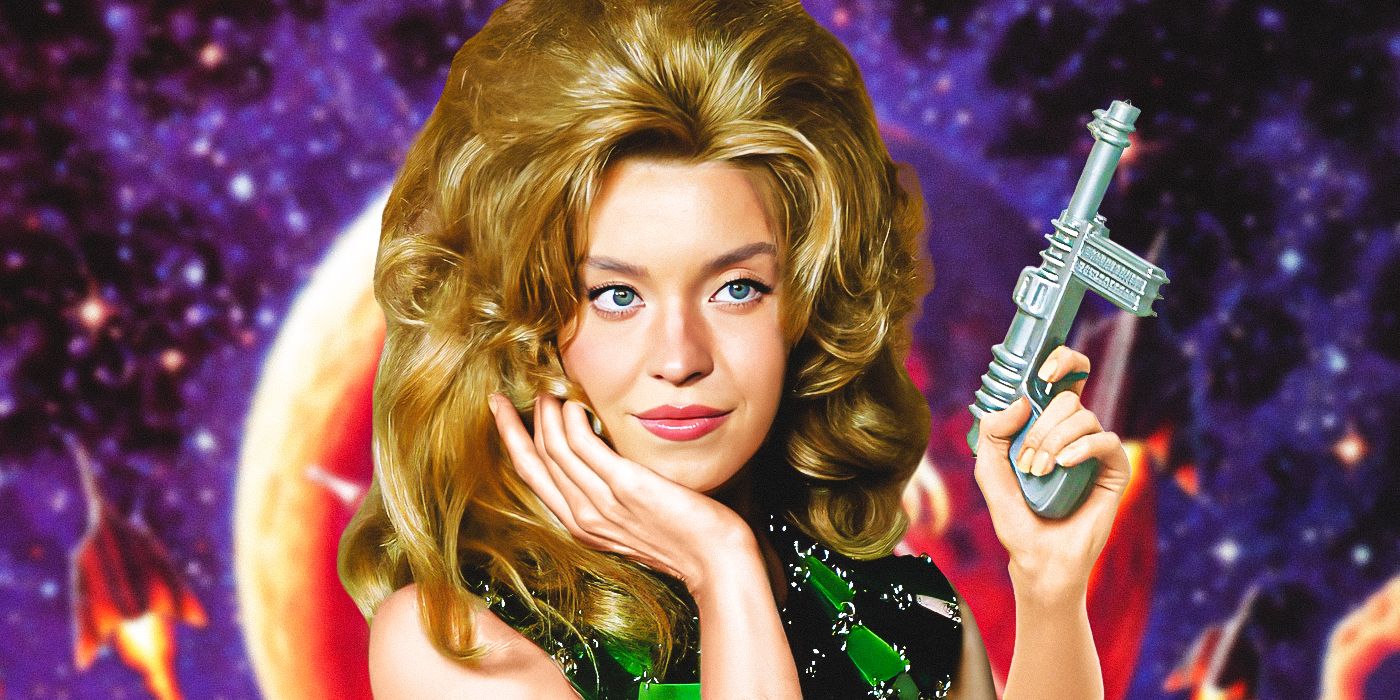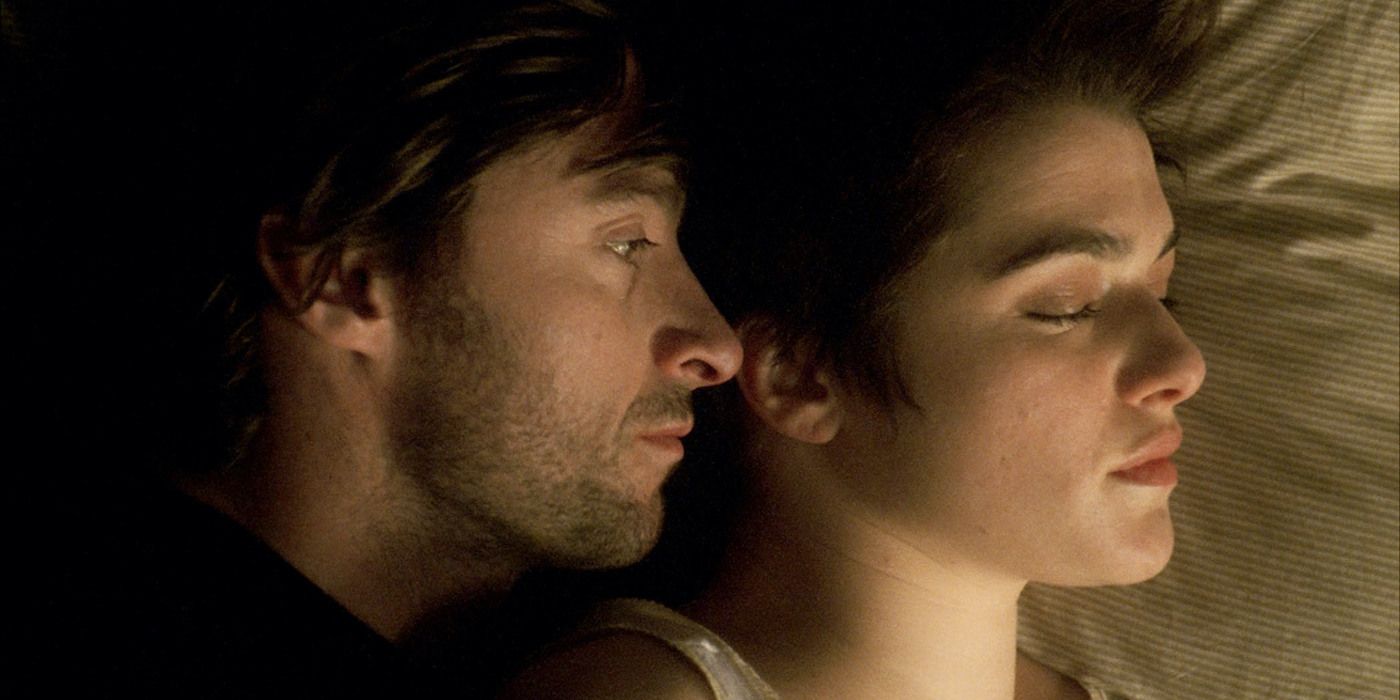A24’s Under the Silver Lake is a paranoia-drenched neo-noir, a modern Hitchcockian thriller in the vein of Rear Window and Vertigo from director David Robert Mitchell (It Follows).
The film opens with graffiti scrawled on a window that reads: “BEWARE THE DOG KILLER,” the calling card of a serial canine murderer terrorizing East Los Angeles. At a Silver Lake coffee shop, Sam (Andrew Garfield), 33, stands aimlessly in a long line littered with hipsters waiting for cold brew. Sam is an out-of-work actor and full-time pop-culture enthusiast who drinks all day and chain-smokes Marlboro Red cigarettes like they're going out of style. He’s broke and clearly uninterested in paying his past-due rent. He’s a cliché, a washed-up actor, disenchanted with reality and convinced that life is one big conspiracy.
Sam doesn’t get out much and uses binoculars to creep on his topless neighbor from the shadows of his dilapidated apartment balcony. Sam also believes to have cracked a secret code hidden in the eye movements of Wheel of Fortune co-host Vanna White. In short, he’s a weird guy. Then one evening, a mysterious girl named Sarah (Riley Keough) moves in, becoming the object of his deluded affections, before abruptly disappearing without a trace. The film follows Sam as he descends into a hotbed of half-cocked conspiracy theories to uncover the mystery behind Sarah’s disappearance. Hilarity, violence, and madcap antics ensue.
Ending Explained
Sam lives a double life in a deluded Hollywood fantasy, an amoral leading man with a twisted sense of reality, and an obsessive infatuation with the opposite sex. Sam sees Sarah as iconography, a trophy to place atop his mantle like the film award he’ll never obtain. Sarah, to Sam, is a Marilyn Monroe reincarnate, a fabrication of his warped psyche that he feels compelled to rescue. What’s most baffling is that Sam’s suspicions were correct. He cracked the code, uncovered a conspiracy, and still came up empty, which is classic Film Noir 101.
At a rooftop party searching for clues, Allen (Jimmi Simpson) and a party goer in a green dress criticize an off-the-rails Millicent Sevence (Callie Hernandez). Sam softens and empathetically replies that it’s hard to gauge what a person might do when in pain. Sam is clearly in pain, and vulnerable and, coupled with his career stagnation and deteriorating mental state, manifests a full-blown psychological breakdown. Sam’s coo-coo for Cocoa Puffs. He consistently changes the subject when talking about the Dog Killer.
The most obvious and glaring answer to the ending is that Sam, despondent and unstable, is the infamous Dog Killer, pointing to his increasingly abnormal nocturnal behavior and deteriorating mental health (the night terrors, the hallucinations, etc.). Sam’s a disarmingly charming guy who leers more than seems publicly appropriate with a penchant for stalker-like conduct and violent outbursts, internally angry with his current situation, but the red flags are harder to spot when you have a face like Andrew Garfield. Though the film is surreal and absurdist, it suggests, is it Los Angeles that's odd, or is it merely Sam? The answer is unequivocally both. He’s a clinically depressed, (possibly) paranoid schizophrenic fogging the lines of his reality with homicidal fallacies based on fictional film fantasies in a world controlled by a shadowy elite. A powerless guy stripped of hope in an unfair, unjust world, Sam is acting out and demanding to be seen, and his dog killing exploits are his way of seeking acknowledgment from the banal existence that’s turned its back on him. There’s complex stuff at work behind Sam’s curtain, and his secrets are beginning to unravel as fast as he unravels the conspiracy, but it’s all he knows. As the film strongly suggests, subliminal messages secretly embedded throughout pop culture essentially made him crazy — but how?
On his way home from the Last Bookstore, Sam shuffles home where he discovers Sarah’s dog “Coca-Cola,” who Sam feeds a red dog biscuit (remember this). During their introduction, Sarah recalls Coca-Cola as “like a ray of sunshine,” an old Coke slogan she learned from her grandmother, who she refers to as “a smart lady.” Sam proclaims to Sarah that his dog recently “died” (remember that, too) and she invites him inside and flirtatiously accuses him of spying on her from his balcony. Sam awkwardly denies the accusation, and the two get high. They watch the 1953 Marilyn Monroe film How to Marry a Millionaire in Sarah's bedroom. It appears to be her favorite movie because she has a vintage framed poster on her wall and special edition dolls of the three leads on her dresser. After Sarah disappears without a trace, Sam breaks into her empty apartment and finds a shoebox in Sarah’s closet. Inside, Sam finds a Polaroid photo of Sarah (which he keeps), a pink vibrator (which he sniffs), and the three dolls amongst the sentimental debris and junk. Shortly after that, a woman (Zosia Mamet) enters the house, takes the box, and delivers it to a man disguised as a pirate, who escapes in a limo. During the climax, after Sam uncovers that Sarah is part of a mysterious polygamy cult for elite men, he sees a photo of Jefferson Sevence and his “wives,” with Sarah cradling the dolls in her arms. The woman had returned the dolls to Sarah, it appears.
Earlier in the film, the Under the Silver Lake zine author reveals a grab bag of conspiracy theories, including a story about subliminal messages secretly embedded in popular culture, from music to movies to television. The author believes society is unknowingly controlled by corporate interests through brainwashing and shows Sam a collection of print ads secretly designed to groom young women through hidden psycho-sexual innuendos. The film suggests, subtly, that Sarah and the other wives are victims of an elaborate brainwashing scheme designed to make women more submissive. And the Coke slogan and the How to Marry a Millionaire infatuation hint that the author’s theory was correct, and Sarah was unknowingly groomed by the sexist subliminal messaging she was exposed to as a young girl, presumably by her grandmother.
It’s hard to say if Sam ever puts this together because he seems less interested in subliminal messages and more interested in “codes meant only for certain people” and doesn’t address it further. In the end, Sam unravels the secret but cannot “save” Sarah.
Sam attacks “Jesus” (Luke Baines) the leader of a band called Jesus and the Brides of Dracula, in the bathroom at a party and beats him for information. A bloodied “Jesus” explains that his music label threatened to terminate the band’s contract if they didn’t record songs written by a mysterious third party known as “the songwriter.” Later, after breaking into his massive estate, the songwriter (Jeremy Bobb) reveals to an increasingly despondent Sam that he wrote every hit song, from past to the present, to manipulate the masses for greedy corporate interests, which prompts Sam to kill him. Though ultimately a loose end, the songwriter confirms the author’s subliminal messaging conspiracy — and Sam and the entire world are all victims to it, including us, the viewers. Many of the secret codes buried within the film are ultimately innocuous, like biscuits for viewers to follow that eventually lead nowhere, just like Sam. Though Sam uncovers the truth, his pursuit for answers is ultimately meaningless; he is powerless in a world manipulated by an elite coven of wealthy industrialists, and life is pointless. Sam is so focused on finding Sarah that he’s unable to see the bigger picture. Like Sarah, Sam was unknowingly groomed through his mainstream media habits, but his single-minded pursuit blinds him from the more prominent conspiracy at play — global mind control.
In the film’s final moments, Sam returns home empty-handed, and it’s safe to assume that the insidious plot to control the minds of the world’s population through hidden messages will continue. Sam is a small fish in a big corrupt pond, outmatched and at the end of his rope, like the ending of Chinatown—there’s nothing he can do, and the cycle of “injustice” will ultimately persist, which is as neo-noir as it gets. And though Sam isn’t necessarily focused on subliminal messages, he’s inherently a victim of media grooming, which to a degree, explains his erratic behavior. The video games, the movies, Nirvana — all play a crucial part in Sam’s warped personality.
In the end, after uncovering the cult that claimed Sarah’s life, Sam awakens in a Legends of Zelda–esque dungeon where a man called the Homeless King (David Yow) interrogates him about two doggy biscuits found in his pocket. Sam pleads for his life and reasons that he’s not the Dog Killer stalking Los Feliz and the biscuits are merely keepsakes to remind him of his ex and her dog. The Homeless King cuts Sam loose, and he returns to his apartment complex and sleeps with the topless woman he'd spied on earlier. After sleeping together, Sam watches from afar as his landlord and the police officer evict him when he notices the hobo code symbol for “keep quiet” painted on his wall–an unmistakable message from Homeless King to keep his mouth shut or else.
The film suggests that the Homeless King, the official steward of the cult’s confidential exploits, knows Sam’s secret, and though meant as a threat, Sam finally feels seen, which causes him to smile before the credits roll. Sam is free of his dark secret that undoubtedly consumed his conscious and subconscious. Under the Silver Lake’s themes and explanations are never ending; it's about the “male gaze,” Hollywood elitism, and the darkness that forms when wasted potential, aimlessness, anger, and self-destruction collide–for idle hands are the Devil’s plaything. It’s a toxic male fantasy about a guy attempting to “save” a damsel who he believes to be in distress but isn’t. Sam, despite all of his issues and darkness, he’s only trying to connect. And that brief connection with Sarah, whether real or imagined, validates his journey because he’s unemployed and has nothing better to do. What’s most unsettling is Sam’s purpose for finding her. Is it for love, or does he want to murder Sarah? Sam’s visions seem to suggest the latter.
Under the Silver Lake is about serial killers, hidden meta-clues, codes, ciphers, scandals, conspiracy theories, and the obsessive online sub-cultures that love them–and Mitchell’s film is anything a viewer wants it to be; read into it or don’t. At the secret catacomb bar beneath Hollywood Forever Cemetery, “Balloon girl” explains to Sam that there’s no secret worth solving and that it’s silly for him to waste his time on something that doesn’t matter. Suppose you read into the film and digest all it offers, mainly the subtle subtextual clues hidden behind the codes. Will you see the signs and uncover the mystery just below the surface of the Silver Lake, or not? It’s purely a choice and depends on how much free time you’re willing to spend on cracking Zodiac ciphers and following rabbit holes that lead to the same frustrating conclusion: nothing. But in some strange way, Sam is triumphant in the end in his own weird, warped way.








